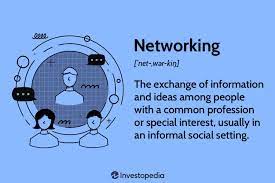The Power of Networks in Today’s Digital World
In the modern age of technology, networks play a crucial role in connecting people, devices, and systems like never before. Whether it’s the internet that links individuals across the globe or the local area network that enables seamless communication within an office, networks have become the backbone of our digital society.
Networks come in various forms and sizes, each serving a specific purpose. From wireless networks that allow us to access information on-the-go to data centre networks that store and process vast amounts of data, the diversity of networks is astounding.
One of the key advantages of networks is their ability to facilitate collaboration and information sharing. Through networked systems, individuals can work together in real-time, share resources efficiently, and access information from virtually anywhere. This interconnectedness has revolutionised how we communicate, conduct business, and interact with one another.
Security is a paramount concern when it comes to networks. With cyber threats on the rise, protecting networked systems from malicious attacks is more important than ever. Network security measures such as firewalls, encryption protocols, and intrusion detection systems help safeguard sensitive data and ensure the integrity of communication channels.
As technology continues to advance, so too will the capabilities of networks. The advent of 5G technology promises faster speeds and lower latency for mobile networks, while advancements in cloud computing are reshaping how data is stored and accessed across distributed networks.
In conclusion, networks are the foundation upon which our digital world is built. They enable us to connect with one another, access information instantaneously, and leverage technology in ways previously unimaginable. As we look towards the future, it is clear that networks will continue to evolve and shape the way we live and work in profound ways.
Top 6 Essential Tips for Securing Your Network
- Ensure your network is secure by using strong passwords and encryption.
- Regularly update your network devices’ firmware to protect against vulnerabilities.
- Implement access controls to restrict unauthorized users from accessing your network.
- Monitor network traffic for any unusual activity that could indicate a security breach.
- Backup your important data regularly to prevent loss in case of a network failure or cyber attack.
- Consider using virtual private networks (VPNs) for secure remote access to your network.
Ensure your network is secure by using strong passwords and encryption.
To ensure the security of your network, it is essential to implement robust measures such as using strong passwords and encryption. Strong passwords that combine letters, numbers, and special characters help prevent unauthorised access to your network. Additionally, encryption adds an extra layer of protection by encoding data transmitted over the network, making it unreadable to anyone without the proper decryption key. By incorporating these security measures into your network infrastructure, you can safeguard sensitive information and minimise the risk of cyber threats.
Regularly update your network devices’ firmware to protect against vulnerabilities.
Regularly updating your network devices’ firmware is essential in safeguarding your network against potential vulnerabilities. Firmware updates often include patches and fixes that address security flaws and strengthen the overall resilience of your network infrastructure. By staying proactive and ensuring that your devices are running the latest firmware versions, you can significantly reduce the risk of cyber threats and keep your network secure. Remember, maintaining up-to-date firmware is a simple yet effective way to enhance the protection of your network and ensure smooth operations.
Implement access controls to restrict unauthorized users from accessing your network.
Implementing access controls is a crucial step in securing your network and protecting sensitive information from unauthorized access. By setting up restrictions and permissions, you can ensure that only authorised users are able to connect to your network, reducing the risk of data breaches and cyber attacks. Access controls provide an additional layer of security, helping to safeguard your network infrastructure and maintain the integrity of your communication channels.
Monitor network traffic for any unusual activity that could indicate a security breach.
It is essential to monitor network traffic diligently for any unusual activity that could signal a potential security breach. By keeping a close eye on the flow of data within your network, you can quickly identify suspicious patterns or anomalies that may indicate unauthorized access or malicious activity. Regularly monitoring network traffic allows you to take proactive measures to address security threats promptly and safeguard your systems and data from potential breaches.
Backup your important data regularly to prevent loss in case of a network failure or cyber attack.
It is crucial to regularly back up your important data to mitigate the risk of loss in the event of a network failure or cyber attack. By maintaining up-to-date backups of your critical information, you can ensure that even if your network is compromised, you will still have access to essential files and documents. Implementing a robust backup strategy not only safeguards your data but also provides peace of mind knowing that you can quickly recover in the face of unforeseen circumstances.
Consider using virtual private networks (VPNs) for secure remote access to your network.
When setting up remote access to your network, it is advisable to consider using virtual private networks (VPNs) for enhanced security. VPNs create a secure encrypted connection between the user and the network, protecting sensitive data from potential cyber threats. By utilising VPNs, you can ensure that remote access to your network is safe and reliable, allowing employees to work from anywhere with peace of mind knowing that their communications are secure.
Tags: 5g technology, access controls, cloud computing, collaboration, connectivity, cyber threats, data storage, digital world, encryption, firmware updates, information sharing, network security measures, networks, security, strong passwords, technology
